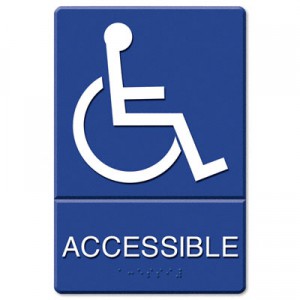Can Protections for The Disabled Go Too Far?
The Americans with Disabilities Act, as well as the laws of many states, requires most businesses (which sell goods or services to the general public) to make a reasonable effort to ensure that their facilities are accessible to persons with disabilities. It imposes many new requirements on new construction projects, including wheelchair ramps and the like.
Obviously, it would be impractical to impose these same standards on old buildings, requiring expensive (or impossible) retrofits, so it only requires older buildings to make modifications for accessibility when such modifications would be “readily achievable,” meaning that making the modification would not be prohibitively expensive or disruptive to the owner’s business.
 The ADA, as well as a similar California law, gives individuals with disabilities a private right of action to enforce its provisions. Basically, if a business is not accessible to a person with a disability, that person can sue the business owner for monetary damages.
The ADA, as well as a similar California law, gives individuals with disabilities a private right of action to enforce its provisions. Basically, if a business is not accessible to a person with a disability, that person can sue the business owner for monetary damages.
In San Francisco, there has been a huge wave of such lawsuits, mostly against small businesses. Some businesses, in the face of crippling legal bills and court judgments, have had to shut down or move as a result. Now, an argument can be made that it’s economically advantageous to make sure that as many people as possible are able to purchase goods and services from as many businesses as possible, in theory offsetting the economic cost of making the required improvements in the first place.
If that’s the prime motivator for the ADA, what’s the economic benefit of forcing a business to close, thus making its goods and services, as well as the jobs it creates, unavailable to everyone? Even if the argument for such rules doesn’t lie in economics, but in basic notions of fairness to the disabled, is an attitude of “if I can’t have it, nobody can” really fair?
Obviously, we should have policies that encourage businesses to make their facilities accessible to individuals with disabilities, but if a few lawyers and “professional litigants” (some of whom allegedly have no desire to actually patronize the businesses they’re suing, and simply go around the city looking for technical violations of accessibility laws) can cause a large number of businesses to shut down, perhaps some of the provisions of the ADA should be re-examined.
For starters, perhaps the private right of action should be tweaked. Obviously, with laws like this, a private right of action is the only practical way to enforce it, since it would be totally impractical to have a nationwide staff of inspectors checking for violations of the ADA.
However, the private right of action should be structured in such a way that suing under the provisions of the ADA is not a viable way to make a living, and the only people who have an incentive to file lawsuits under it are those who are actually harmed by their inability to access a business. Perhaps it should only provide for injunctive relief (a court order to fix the problem, if possible), and compensation for real, demonstrable losses.
These cases in San Francisco are especially sad, since many small business owners in that city do not speak English as a first language, and can’t afford to hire an attorney to represent them. As a result, they end up settling with the plaintiffs, in part because they don’t fully understand their legal rights. While it’s not entirely clear what can be done about this (you’re not entitled to a court-appointed lawyer in civil suits), a good start might be for some legal aid organizations to start giving volunteer legal advice to small business owners.
While it’s rare for volunteer attorneys to represent “business interests,” the plight of an immigrant family who runs a small restaurant that’s just making ends meet, and gets sued out of nowhere for a violation of the ADA they can’t afford to correct, isn’t all that different from the plight of, say, an employee who’s been wrongfully terminated, or a tenant who’s about to be thrown onto the street by his landlord.
Obviously, volunteer attorneys can’t help everyone in need of legal services, but it would be a good start. And, without passing judgment (really!), it’s fair to say that many legal aid organizations trend to the left, politically. I mean it when I say there’s absolutely nothing wrong with that, but it does tend to turn off more conservative and libertarian-minded lawyers and law students from volunteering with them.
However, if legal aid organizations considered helping small business owners who can’t afford to hire attorneys, some of those lawyers who might have otherwise never considered volunteering with a legal aid organization might have a change of heart.


Comments